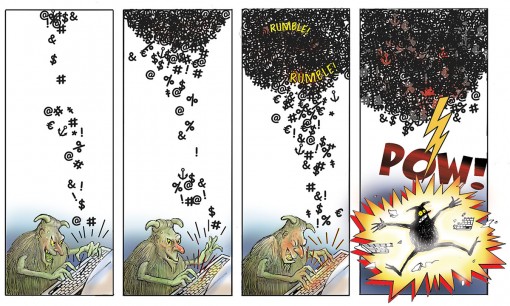An Internet Story for Our Time


Can venting angrily on the Internet lead to heart disease? In this week’s eSkeptic , Carol Tavris discusses some research that points to a significant correlation between our negative language patterns (such as anger, hatred, and aggression) and health risks such as heart disease. Dr. Carol Tavris is a social psychologist and coauthor, with Elliot Aronson, of Mistakes Were Made (but not by ME) .
T he story that follows is prehistoric. It involves a once-famous columnist, a letter (the written kind), the U.S. post office, an apology, and a moral.
The columnist was Russell Baker, who had written an essay that I, in my self-righteous gadfly-in-training youth, regarded as a sarcastic dismissal of what was then called women’s liberation—the movement for mere improvements in education, work, family life, reproductive rights, and so forth. These issues were important to me, so I wrote him a letter, full of what I thought were equally sarcastic, witty put-downs. I failed to sleep on it overnight. I mailed it.
Baker returned my letter to me— edited. I’d irked him, and he had written all over the margins with sparky annoyance.
I replied, apologizing for my rude tone and explaining what I’d meant to say.
He replied warmly, and ended, “Could this be the beginning of a beautiful and civilized correspondence?”
At the time, researchers in many fields, from social psychology to epidemiology, were rapidly dismantling the “catharsis hypothesis,” held by millions of therapists, group leaders, teachers, and parents who believed that it was important for a person’s mental and physical health to ventilate their anger. (You can still buy bats and dolls to use for this reason in the privacy of your own home.) This belief stemmed from a misreading of Freud, who thought that aggressive energy builds up in us like steam in a teapot, and will boil right over in disastrous ways if not “let out.” However, they missed part 2 of Freud’s argument, which was that the “letting out” part should be sublimated into constructive activities, such as creating art. Freud would have been horrified by the many therapists who were handing out bataca bats to violent teenagers and to quarreling married couples with instructions to pound away.
Alas for Freud and the catharsis contingent, it was turning out that the mindless ventilation of anger, especially if done in an angry, aggressive way, makes people angrier, turns up the heat in an argument rather than reducing it, and rehearses and prolongs grievances rather than getting rid of them. Indeed, by the 1980s, antagonistic hostility had been identified as a strong, independent predictor of heart disease. 1 There are a few conditions under which the angry expression of anger is cathartic—that is, makes the ventilator feel better—but the crucial two rarely occur at the same time, at least on this planet. They are:
- your expression has to be quid pro quo — you can’t use an AK-47 to retaliate against a water pistol, or vice versa, and
- your target either listens in silence and does not reply , or says, “Yes, you’re entirely right; thank you. I’ll change my behavior/attitudes/political views right away.” That is, there must be no negative consequences for the ventilator.
All that catharsis research would have predicted exactly why trolls have proliferated like crabgrass on the Internet lawn: When comments have no negative consequences for anyone who posts them, you can be as mean, stupid, vindictive, and insulting as you wish— while complimenting yourself, as I did in my letter to Baker, on your brilliant takedown of the opposition. No one knows it’s you, and there usually are no consequences for you.
That’s why, as I was contemplating yet another outbreak of ugly insults, this time on Yik Yak, I was delighted to discover that perhaps there are unexpected consequences. I came upon a research article with the irresistible title, “Psychological Language on Twitter Predicts County-Level Heart Disease Mortality.” 2 “Oh, thank you, Mr. or Ms. God I don’t believe in!” I said to myself.
Of course researchers cannot investigate the relationship between “psychological language” and heart disease by asking thousands of individuals to kindly provide their tweets and cardiovascular history. But the relationship can be studied at a community level. Communities, like individuals, vary in risk factors for heart disease, including cohesiveness, stress levels, safety, and rates of smoking and drug use: the Centers for Disease Control (CDC) maintain health information and mortality rates across the nation. Moreover, social- media-based “digital epidemiology” has been providing scientists with a faster and deeper understanding of public health issues. Google has used search queries to measure flu trends and rates of other illnesses, and some studies have used Twitter to track ailments from Lyme disease to depression.
Accordingly, Johannes C. Eichstaedt, a psychologist at the University of Pennsylvania, and 12 colleagues decided to track language expressed on Twitter and see if it correlated with age-adjusted rates of death from atherosclerotic heart disease (AHD). They gathered a data set of 826 million tweets—from 1,347 counties for which at least 50,000 tweeted words were available and for which the CDC could provide health and mortality rates from all causes. Twitter had provided them with a 10% random sample of tweets, and although the Twitter users themselves could not be identified individually, many reported their locations in their user profiles, so the researchers could map tweets to counties.
The investigators then analyzed the tweets, using established methods of inferring emotions and other psychological states through language analysis. For example, the frequency of the word hate ranged from 0.009% to 0.139% across counties. But, realizing that words can be used ironically (“yeah, I sure hate ice cream”) or negation (“I don’t hate you”), they used clusters of semantically related words to extract major factors: hostility and aggression (frequency of words such as bullshit , bitches , fuckin , shitty , pissed , motherfucker , asshole , idiot , etc.); hate ( jealousy , hate , haters , bitches , nasty pieces , liars , despise ); optimism ( dreams , achieve , goals , perfection , reaching , possibilities , challenge ); positive experiences ( wonderful , friends , good , great drinks , good company , laughs , fantastic , enjoyed , hope ).
The results could not have been clearer. Language patterns reflecting negative social relationships, disengagement, and negative emotion—especially anger, hatred, and aggression—emerged as the strongest risk factors. In fact, the correlations between angry Twitter language and heart disease remained significant even after the researchers controlled for income and education. Language predicted AHD significantly better than did a traditional model that combined common demographic, socioeconomic, and health risk factors including smoking, diabetes, hypertension, and obesity.
And now for the caveat. Have you thought of it? “The people tweeting are not the people dying,” the researchers remind us. Twitter users tend to be young (median age = 31), too young to have developed coronary artery disease. Moreover, at an individual level, there are numerous risk factors for heart disease, from heredity to physiological reactivity. But our physical and social environments influence how we behave, the levels of stress we feel, the degrees of cohesiveness versus alienation we feel—all of which influence our health. “The language of Twitter,” the researchers conclude, “may be a window into the aggregated and powerful effects of the community context.”
Moral of the story? The next time you’re angered by idiotic, vituperative trolls, don’t respond in kind. Let them get the heart attack one day. The rest of us can take a lesson from Russell Baker and pursue a beautiful, and civilized, response. ![]()
http://www.skeptic.com/reading_room/an-internet-story-for-our-time/
Tags
Who is online
129 visitors

So being a troll or acting like an asshole online can eventually lead to heart disease? Sounds good to me. Trolls die younger then none trolls and it serves them right.
acting like an asshole online
Nothing we ever see here on NewsTalkers
Oh no! Never. Everyone here is always under control of themselves. /s